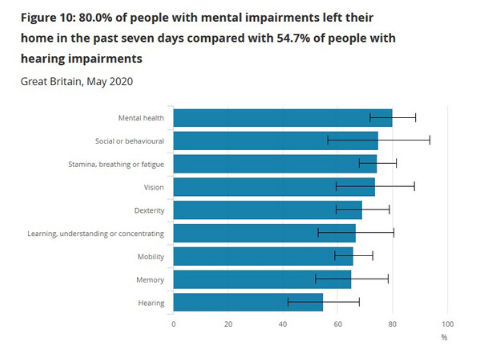Coronavirus and the social impacts on disabled people in Great Britain: May 2020
The Office for National Statistics has published a report on the Indicators from the Opinions and Lifestyle Survey which shows the social impact of the coronavirus (COVID-19) pandemic on disabled people in Great Britain. This release uses two waves of survey results covering 14 May to 24 May 2020 and includes indicators broken down by impairment type.
Hearing Impaired people least likely to leave their homes
A higher proportion of disabled people than non-disabled people were worried about the effect of the coronavirus pandemic on their well-being (62.4% for disabled people compared with 49.6% of non-disabled people); their access to groceries, medication and essentials (44.9% compared with 21.9%); their access to health care and treatment for non-coronavirus-related issues (40.6% compared with 21.2%); and their health (20.2% compared with 7.3%) in May 2020.
Concerns about well-being tended to be most frequent among those with mental health and sociobehavioural-related impairments, whereas concerns about access to essentials tended to be most frequent among those with hearing- or dexterity-related impairments.
Some differences in tendency to report leaving the home can be observed when the type of impairment a disabled person reports is considered. Figure 10 shows that among disabled people with different reported impairments, 80% of disabled people with a mental health impairment (80.0%) had left their home, while only 54.8% of people with a hearing impairment and 65.9% of people with mobility impairments reported leaving theirs. Older age is associated with an increasing prevalence of some impairment types (for example, mobility or hearing impairments) and with decreasing likelihood to report leaving the home. Future analysis could seek to examine controlling for these potential factors.

Download the full report Coronavirus and the social impacts on disabled people in Great Britain May 2020
